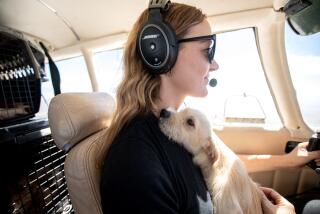Unfriendly Skies Often Far From Purr-fect for Non-Human Passengers : Pets: A debate is raging over whether a misplaced cat and the millions of other animals transported every year are family members or just another piece of baggage.
- Share via
WASHINGTON — Spanky the cat hasn’t been seen since he was loaded onto a KLM airlines flight in Saudi Arabia two days before Christmas. The cat’s cage turned up in the Amsterdam airport, but the cat was nowhere to be found.
The Dutch airline has apologized for the loss and offered to refund the $225 shipping cost, but that has done little to soothe owner Kevin McGowan, who is living in Potomac, Md., after working for three years in the Middle East.
“It wasn’t just a little cat. It was a family member,” McGowan said. “And they’re treating it as if it was a piece of luggage.”
A debate is raging over the question of whether Spanky and the millions of other pets transported on airplanes every year are family members or just another suitcase.
A federal judge in Manhattan ruled recently that a dead golden retriever was worth no more than a bag of clothes. The judge sided with American Airlines in a suit brought by the owner of a dog that died from heatstroke in a cargo hold.
Animal rights activists said the decision underscores what they’ve been saying for years: that airlines are indifferent to animals and tolerate a scandalous rate of animal loss, injury and death as a cost of doing business.
“The problem is so bad that we have issued a warning to all pet owners that they should never ship their pet in anything but the cabin of the plane,” said Brenda Foster of the Humane Society of the United States.
Spokesmen for several airlines said that they always treat pets with extreme care and that even though accidents occur, they represent only a tiny fraction of the vast number of pets transported.
Nonetheless, more than 100 animals have died aboard airlines since 1990. Fifty-six puppies died on one Trans World Airlines flight, and 32 dogs died on a Delta Air Lines flight.
United Airlines paid a $48,000 fine when 24 dogs died on one of its flights, and five dogs died on American Airlines flights.
In those and dozens of other cases prosecuted by federal authorities, family pets and animals in commercial airline shipments allegedly suffocated or suffered heatstroke in cargo holds that became stifling on hot days.
“People think it’s perfectly safe, and that is just not true,” said Foster, who said her group has received complaints about every major airline in the country.
Gus Whitcomb, a spokesman for American Airlines, said his company carries about 50,000 animals a year, with rare problems.
“We feel we have the same responsibility for a pet that we do for a passenger,” Whitcomb said. “If we really did carry pets and we didn’t care about them, the death rates would be a lot higher.”
Whitcomb said that although the airlines recognize the emotional and sentimental value of a pet to its owner, “an animal is checked baggage from a legal liability standpoint.”
Whitcomb likened a lost pet to a lost home movie. While both are irreplaceable and have enormous value to their owners, when they are lost, insurance companies pay only on their actual value.
That assessment was endorsed in February by U.S. District Judge Shirley Wohl Kram of New York. Kram ruled that a man whose golden retriever, Floyd, suffered heatstroke in an American Airlines cargo hold could not sue for anguish and loss of companionship.
The judge said that Andrew Gluckman of New York was entitled only to lost baggage compensation. Jolene Marion, Gluckman’s attorney, said Floyd died after sitting for more than an hour on a Phoenix runway in a cargo hold that reached 140 degrees.
American offered to settle the case for $1,250, the standard compensation for lost baggage, and fought to keep Gluckman from collecting more. Marion, who specializes in animal rights cases, said the case highlighted the airlines’ indifference to animals.
At United Airlines, spokesman Joseph Hopkins said his company makes about $10 million from the 200,000 live animals it transports each year, giving the company an economic as well as a moral obligation to treat animals well.
Hopkins said United’s commitment to animals was demonstrated in December when a United pilot dumped $2,300 worth of fuel and made an unscheduled landing in Wisconsin after being alerted that a cat and a dog had been improperly loaded in a cargo hold. The animals were not harmed.
Between 1991 and 1993, the U.S. Department of Agriculture, which enforces the Animal Welfare Act, fined six airlines a total of $67,500 for violations. An additional 80 violations are pending.
More to Read
Sign up for Essential California
The most important California stories and recommendations in your inbox every morning.
You may occasionally receive promotional content from the Los Angeles Times.













